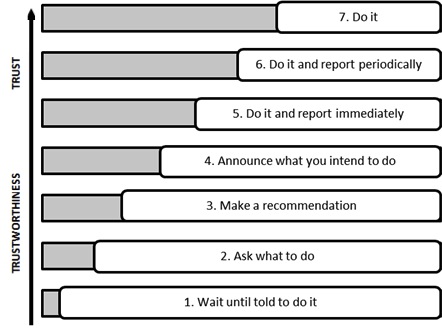 The 7 levels of authority/decision-making
The 7 levels of authority/decision-making I can’t tell you how often I hear people complain that managers around here just don’t make decisions! Usually that is because of one of 3 things: (i) the scope of authority is unclear and it is unclear who should make the decision in the first place; (ii) there is fear that if the “wrong” decision is made, there will be negative or punitive repercussions; (iii) managers don’t have a process that they follow in making a decision, so they have little confidence in themselves. As a result, decisions are not made and this blocks up the works. The resulting frustration causes people to disengage – after all, what’s the point of attempting to be engaged when one gets stymied at every turn. Don’t underestimate the resentment that builds towards the “leader” who doesn’t make decisions. If you have difficulty making decisions (for whatever reason), you will lose the respect of your team. Don’t be surprised if they make jokes at your expense behind your back. Don’t be surprised if they do the big eye roll as you leave the room having promised to look into something.
The same applies to your meetings. The purpose of meetings is to make decisions! How many meetings do you attend where items are carried over from meeting to meeting? What are your views about such meetings? My guess is that you drag yourself to these meetings, fully expecting that your time is about to be wasted. What about those meetings where people talk and talk, but no decisions are made. Do you look forward to these meetings with anticipation? My guess is not so much. We all enjoy meetings where the debate is vigorous, clear decisions are taken and action is reported on at the next meeting.
If you are unclear on the limits of your authority, have a meeting with your manager and get clarity. Use the table below and agree on the level at which you will deal with each of your responsibilities. If you are being asked to function at Level 4 or below, also reach agreement on the process by which you will progress to higher levels of authority (as your manager’s trust in you grows).
Use an effective decision-making process. I like GROW, which you can learn more about here: https://en.wikipedia.org/wiki/GROW_model. Alternatively, you could learn more from here: https://www.mindtools.com/pages/article/newTED_00.htm
What is your greatest decision-making challenge? Is it your limits of authority? Are you afraid of the consequences of imperfect decisions? Do you lack a trusted process that you follow in order to arrive at solid decisions? Draw up a plan for yourself that will improve your own decision-making confidence and ability.
Catch up on previous articles by following this link, and please send me your feedback on how they are changing or improving your leadership capacity and approach.

 RSS Feed
RSS Feed


